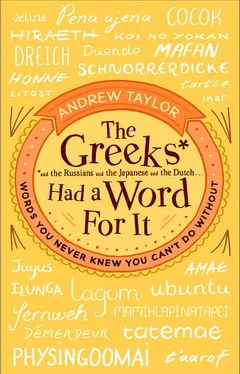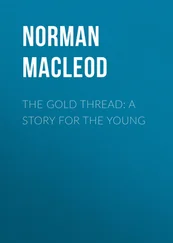But one word survives: mamihlapinatapei ( MAH-michk-la-pin-a-TA-pay , where the chk is pronounced at the back of the throat, like the Scottish loch ). It refers to an unspoken understanding between two people, both of whom want to start something but who are each reluctant to make the first move. It’s very like the Japanese koi no yokan , then, except that this is essentially a feeling which two people share from the very start. It’s not certain whether it relates specifically to the beginning of an affair, but its relevance to those early moments where each one wonders how committed or willing the other might be is clear. It’s a word that oozes uncertainty and potential.
Many translations suggest that mamihlapinatapei includes a wordless exchange of glances, but even that seems to be too specific for this ghostly word, which seeks to pin down a moment that vanishes like mist. It’s not even certain whether it is a noun or a verb.
And the point about mamihlapinatapei is that it may not relate to the beginning of an affair, or of anything at all. Both the people involved are uncertain about what will happen next – it’s perfectly possible that nothing will and that the moment the word describes will remain one of the wistful might-have-beens that gather around the fringes of our memories.
Generally, we seek to pin words down to a particular meaning, the more specific the better. Vagueness in language is often seen as a lack of accuracy, and you would expect a legal document or a set of building instructions to be clear, concise and unambiguous. But what about when the situation you are seeking to describe is vague and uncertain? Mamihlapinatapei captures the delicacy of a subtle and nuanced moment in a way that in English would demand a sentence or a few lines of a poem.
A bore whose only topic of conversation is him- or herself
Samuel Taylor Coleridge’s poem The Rime of the Ancient Mariner tells the tale of a guest hurrying to a wedding who unwisely catches the eye of a mysterious bearded stranger and as a result sits through 143 verses of his story and misses the ceremony. It’s an experience you may have had – usually without the benefit of hearing at first hand one of the great classics of English literature – when you’ve been buttonholed by charity collectors, religious enthusiasts or political canvassers.
If only you had known the Italian word attaccabottoni ( at-ACK-a-bot-OH-ni ). Once you can name a danger, it’s easier to face it down, and you could have stared the stranger fearlessly in the eye, dismissively murmured, ‘ Attaccabottoni ’, and walked on by. It means a buttonholer, and it refers to the type of bore who manoeuvres you into a corner and proceeds to tell you the long, tedious and apparently endless story of their life, their failed relationship, their children’s success with the violin, or the massive problems they’ve solved single-handedly at work … The one thing it will always be about is them, and how cruelly and unfairly they have been treated.
It might be foolish to waste too much sympathy on Coleridge, however. His friend, the essayist Charles Lamb, used to tell a story about him which amounts to a perfect description of an attaccabottoni . Coleridge had a habit of holding on to the coat button of the person he was talking to, to impress him with the urgency of what he was saying. Then, eyes closed and making languid gestures with his other hand, he would launch into his story, without a pause for breath. Lamb claimed to have put up with this assault on his time and patience for several minutes on one occasion before he took drastic action.
A true attaccabottoni finds nothing remotely interesting but himself.
‘I saw that it was no use to break away so … with my penknife I quietly severed the button from my coat and decamped. Five hours later and passing the same garden on my way home, I heard Coleridge’s voice and, looking in, there he was with closed eyes, the button in his fingers, and his right hand gently waving, just as when I left him.’ [4] E. V. Lucas, The Life of Charles Lamb (London: G. P. Putnam & Sons, 1905).
The tale sounds pretty unlikely, but it’s the sort of anecdote that ought to be true, if only because it reflects the feelings of so many of us when we are in a hurry to be somewhere but can’t bring ourselves to be rude enough to walk away. The only difference is that Coleridge was a dear friend of Lamb’s, and this story is told with a good-humoured affection that few of us feel for the earnest doorstep preachers who occasionally keep us from our dinner.
It’s easy to tell if you have just been the victim of a common or garden bore or of a dedicated and skilled attaccabottoni . Conversations should be a matter of give and take; if, as you limp away wearily from your encounter, you have a nagging feeling that you have learned a lot about the other person but said very little about yourself, then you can be sure that you have suffered at the hands of a master. A true attaccabottoni finds nothing remotely interesting but himself. Or herself – the noun can be masculine or feminine in Italian.
It might be possible to feel a degree of sympathy for an attaccabottoni – anyone who has to clap you in irons to make you stay and listen is unlikely to have a lot of friends. But you should harden your heart – your attacker is exploiting your own decency and good manners and turning them into weapons against you. It would be easy enough to tell them to shut up and walk away, if only you were ruder than you are. If by using the word attaccabottoni – which they won’t understand anyway – you can make yourself feel better about hurrying past, then you will have saved valuable minutes of your life and done no harm.
A gruff, one-word response to someone in authority
There is always room in a language for one more word, which, with its surly defiance, its refusal to engage, its sheer unreason, enables teenagers to drive adults to impotent distraction. One like the English word ‘Whatever’, which says, ‘Yes, I’ve heard you, but I’m not interested, I’m not going to pay any attention, and I’m going to keep doing exactly what it was that you said I shouldn’t.’
A word, perhaps, like the Hebrew davka ( DAV-ka ). It is a word with a long history, its roots reaching back into the ancient Middle Eastern language of Aramaic. It is used in the Jewish Talmud and in rabbinical commentaries on it to mean ‘precisely’ or ‘in this way and no other’. Matzah , for instance, the unleavened bread traditionally eaten during the Passover holiday, is made davka from wheat, barley, spelt, rye and oats. No other grains will do.
Today, davka retains that meaning, but it has also gathered a sense of deliberation and contrariness, so that it often has a sarcastic overtone. English sometimes pulls the same trick with the word ‘precisely’ – ‘Do you know how many biscuits he’d left me in the tin? Precisely one.’ The implication is that you might have hoped for more than that, but one was all you got, and that’s pretty much just as you’d expect.
Davka can have much the same ‘Just like him’ edge to it – ‘I asked for a red shirt, so, davka , he bought me a blue one’ – but it often has a wider implication that the world as a whole is being cruel to you. Fate is not on your side – ‘I was in a hurry, so, davka , the bus was late.’ A child who is said to be ‘doing davka ’ is being contrary and difficult, in the way that children can be.
Читать дальше












